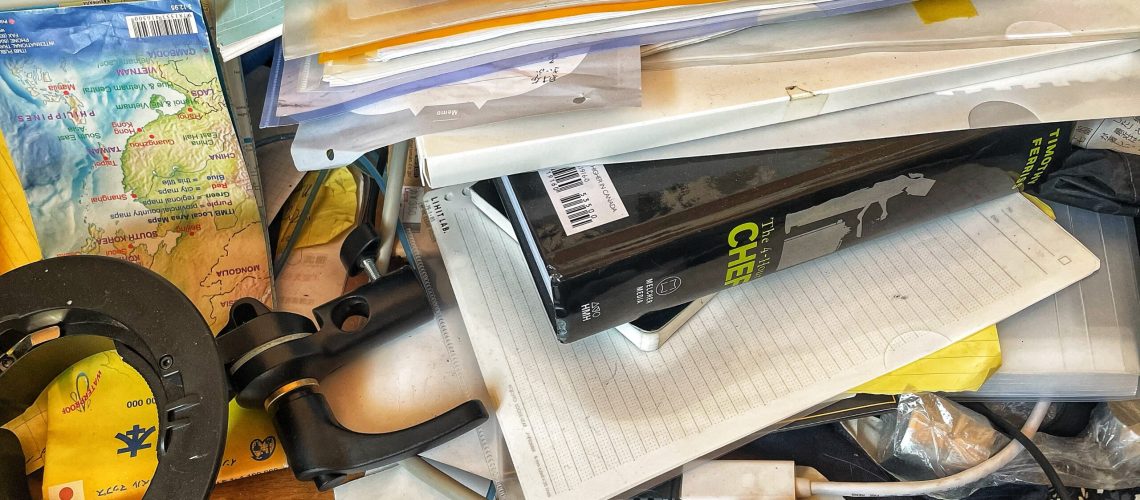Clutter has always been a part of my life, but it took on a sinister aspect as an adult when I first experienced depression. I discovered they fed into each other.
The chaos of my surroundings often reflects a similar state in my mind, and when one gets worse, the other usually does as well. Not just depression, either, but with ADD as well. Some of the mess is a product of feeling like crap. Some of the mess is a product of distraction and my mind always moving on to the next thing before the previous thing is finished.
So I live in a sea of loose ends of various origins and points of progression. Which needs to stop.
Constantly living in a state of disorder contributes to all kinds of negative outcomes. These include but are not limited to:
- A higher baseline of stress in general
- Falling asleep is harder in a cluttered environment
- It’s hard to find anything, which is extremely frustrating
- Greater difficulty in being productive in general
- Enjoyable activities, such as cooking or working on a personal project, become frustrating because you don’t have any clear spaces in which to work
- There’s a high risk of stubbing your toe in the dead of the night
- It’s much harder to keep focus in a messy environment
- Possessions may become dirty, damaged, or broken when part of a huge mess
- All the messy parts of the home cease to function in their normal way
And so-on. If you’ve ever experienced this in your own home, you know the score. If you haven’t, just trust me. It’s crap. And if you live with someone, it’s also crap you’ve shoved into their lives, which is why it can also have a compounding effect on relationships.
If you find yourself emerging from a bad place mentally and, though the dark clouds have largely parted, still find yourself neck-deep in the physical fallout of the difficult period, it can be quite overwhelming to look at the task ahead of you. If you’re intent on getting your surroundings livable again, it’s hard to know where to start and how to proceed, no matter how sincere you are.
Fortunately, as with everything, it’s figure-out-able.
I’ve begun the process superficially, and will tackle the first bigger parts of it this weekend, with the biggest effort being planned for April 30 through May 2, when my partner will visit her family in Takasaki. It’ll be good to have that time in which to really focus with less distraction and zero commitments.
It’ll also be nice to know that she’s coming home to an apartment that is (hopefully) radically cleaner than the one she left a couple of days before.
One reason I’ve failed to make things better before now is that I haven’t really put together a good plan that’s grounded in any clear outcome. Not having a messy home, knowing where things are, being able to do my work: these are all good things and definitely fall into the category of things that I want, but I wouldn’t exactly call them a clear enough aim to be especially useful.
They’re too abstract, though all are practical notions. I haven’t done a good job of really getting clear in my mind what that will look like, what it will feel like, and what it will mean for my life.
This is something I’m trying to address now in my journaling and private writing. I may share some of that eventually, but it’s most useful right now in a private form. One thing that is clear is that long-term depression and extraordinarily low self-esteem really make it harder to believe in a better living environment for yourself or to connect it to any bright, happy, successful future. Those things are hard enough to imagine on their own, and connecting them back concretely to the task at hand is thus made even more complicated.
Still doable, of course. Difficult but doable, and much more important than the difficulty is that it’s really, really worth.
The intertwined problems of disorder and depression have dominated my life for entirely too long. It’s been a sort of ambient self-sabotage for as long as I can remember. I’m used to it, so it’s comfortable in a way that might sound strange to people who haven’t experienced it. It’s why we are sometimes so apt to hold on to something we dislike rather than change. The familiar evil is not uncommonly easier to accept because of its familiarity than the new thing that might be better for us in every way, but which is unfamiliar.
Depression sucks and I fucking hate it, but it’s something I know well enough to make it comfortable (in a shitty way). And generally being happy? That’s a foreign country to me, with languages and customs I do not understand.
Physical clutter is much the same. And while I certainly don’t want to keep either of them as a dominant parts of my life, we must acknowledge that even positive, life-changing positive adjustments can be very stressful.
I’ll share more about the actual process in future posts, including photos, time-lapse videos, etc, but that’s enough for today.
As always, thanks for reading.


This Post Has 3 Comments
Hear ya. I look at tidying up as a game called “sort-ganizing”. Make spaces for all the projects, stash them in the right places. Get the right containers and labels to make it fun. When done leisurely and focused, calms the brain and makes starting new projects so easy. Don’t obsess over the small details at first, start with “big easy decisions” and roll on from them.
There are times when cleaning up feels almost effortless and it goes really quickly, and times when it seems to take forever and more energy than I have on hand. Hoping that my big effort this weekend turns out well.
Pingback: Daily Thoughts for 2021-04-30 Friday - A New Life in Japan